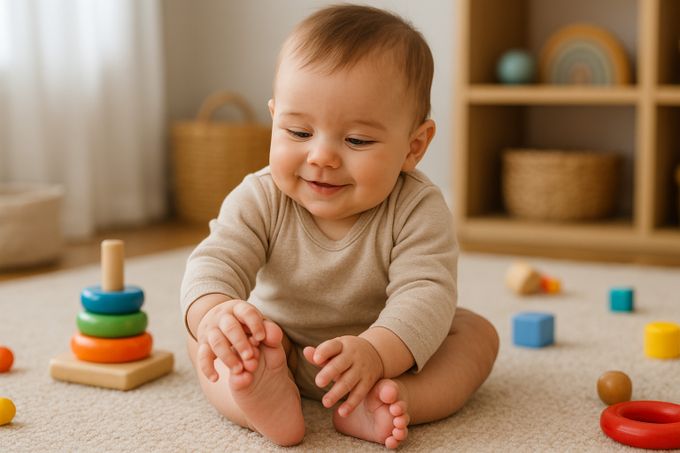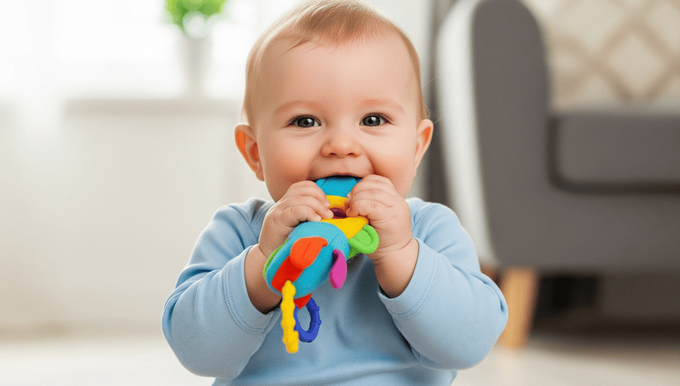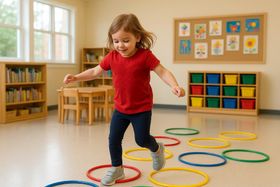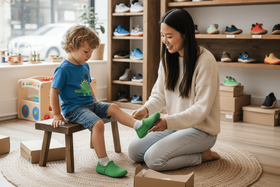How to Support Your Baby's 6-Month Development Milestones
Your 6-month-old is reaching exciting milestones like sitting with support, rolling both ways, and babbling back to you. Every baby develops at their own pace, but there are simple ways to encourage their physical, cognitive, and social growth. This guide shows you exactly how to support your baby's development.
Published September 4, 2025

You're watching your little one grow and change every day, and you might be wondering: "What should my 6-month-old be doing right now?" If you're feeling anxious about whether your baby is developing normally, you're not alone. Most parents have these same worries around the six-month milestones.
Here's what's reassuring: there's a wide range of normal. Some babies hit certain milestones earlier, others later – and both are perfectly fine. Supporting your baby's 6-month gross motor development milestones doesn't need expensive equipment.
It's about understanding what your little one needs and giving them opportunities to practice, explore, and connect with you.
» Are your toddler's knees bent inwards? It might be knock knees
Key 6 Month Development Milestones to Expect
This is what's typical for 6-month-old milestones, but remember, every baby develops at their own pace:
Most babies at this age can roll both ways, sit up with a little help, and push down on their legs when you hold them standing. They'll grab for things nearby, put everything in their mouth, and might even close their lips when they refuse to eat [1].
They're also starting to respond when you say their name, making sounds like "ba-ba-ba," and having little conversations with you. They know your face, light up when they see you, and love looking at themselves in the mirror.
According to UNICEF, these milestones reflect your baby's growing curiosity, interactive engagement, and physical exploration, all part of thriving six-month-old development [2].
Now, your baby might not do all of these things yet – and that's okay. Some babies are content observers who take their time, while others are eager movers.
Understanding Normal Variation in 6-month-old Milestones
Keep in mind that development happens in ranges, not on exact schedules. Some babies roll at 4 months, others at 7 months, and both are completely normal.
When to Check With Your Doctor
If by 6 months your baby isn't smiling, doesn't seem interested in sounds, can't roll over, or feels really stiff or floppy, it's best to check with a paediatrician. Otherwise, try not to worry about small delays.
There are some normal differences that you might notice:
- Boys sometimes get moving a bit earlier, while girls often start "talking" first
- Curious babies might try sitting sooner, while careful babies take their time
- If you talk to your baby a lot, they'll probably babble earlier, too
Expert Tip: These are guidelines, not requirements of what your 6-month-old should be doing. Every baby has their own timeline, and your baby is developing exactly as they should.
» Explore the key developmental milestones infants go through
What Might Delay Your 6-Month-Old's Development Milestones
Don't stress. Most of the time, small adjustments can make a big difference. How come? Well, some modern habits can actually slow your baby's progress, but they're easy to change:
- Too much screen time means less face-to-face interaction, which they need for language and social skills.
- Using car seats, swings, or jumpers too much (when you don't need them for safety) limits the floor time babies need for rolling and building strength.
- Over-scheduling play without letting them explore freely can dampen their natural curiosity.
Expert Tip: Use modern conveniences only when you need them, and make sure to prioritize interactive, active play.
How to Support Your 6-Month-Old's Development Milestones
Your baby is working hard to build the muscles they need for sitting, rolling, and eventually crawling. Here's how to help without pushing:
- Give them tummy time every day, even just a few minutes here and there helps strengthen their neck, back, and shoulders.
- Let them practice sitting with your hands or a pillow behind them for support.
- Put toys just out of reach so they have to work to get them (this helps with coordination).
What's normal? Some babies love tummy time, others fuss through it. I recommend short, frequent sessions. They work better than long struggles. Also, give them floor time on a firm surface where they can rock on their hands and knees.
Encouraging Fine Motor Development in 6-Month-Old Babies
By now, your baby is reaching, grabbing, and passing things from hand to hand. But don't worry if they're still working on it.
- Give them lightweight toys like soft blocks or textured rings that are easy to hold
- If you've started solids, finger foods like soft banana pieces are perfect for practicing those tiny movements
- Roll a colorful ball back and forth. They'll love following it with their eyes and trying to grab it
You can definitely expect lots of dropping, missing targets, and frustrated grunting since they're learning.
Boosting Cognitive Development Milestones in 6-Month-Old Babies
Your baby is figuring out cause and effect, paying attention longer, and getting curious about everything they see and hear.
- Play peek-a-boo and hide toys under blankets. This teaches them that things exist even when they can't see them.
- Let them play with safe kitchen items, like wooden spoons and measuring cups, alongside regular toys.
- Read simple picture books every day. They'll watch the pictures and respond to how your voice changes.
- Follow their lead when something catches their interest, let them explore.
Now, your little one will probably have short attention spans, get distracted easily, and want to mouth everything. This is completely normal.
Nurturing Language Development Milestones in 6-Month-Old Babies
Even though they're not saying words yet, your baby is babbling, listening to your tone, and recognizing voices they know.
- When they make sounds, pause, respond warmly, and copy what they're doing
- Talk about what you're doing, like: "Now we're putting on your socks". This is to help them learn words
- Read board books and sing songs to introduce rhythm
- Name people and objects during playtime
Expert Tip: Short, frequent chats with your six-month-old will work better than trying to have one long session.
Your 6-month-old may be doing lots of babbling that sounds like nonsense, getting quiet when concentrating, and "talking" more to some people than others.
Supporting Social and Emotional Development Milestones in 6-Month-Old Babies
By six months, babies know familiar faces, get excited to see their favorite people, and might be a bit wary of strangers.
- Strengthen your bond by smiling back when they smile, comforting them when they're upset, and responding to their needs quickly
- When they cry or fuss, responding right away builds trust and helps them feel secure
- Play face-to-face games like peek-a-boo to help them express emotions
- If they seem nervous around new people, let them watch from your arms first
What's normal here? Your little one may be clingy some days, seem more social on other days, and have favorite people.
» Find out when your baby can start wearing soft-bottom shoes
Supporting Your 6-Month-Old Baby's Sensory Development
Your baby is learning to put together what they touch, see, hear, taste, and feel when they move. This helps with everything from motor skills to managing their emotions.
- Let them safely feel different fabrics and textures during play
- Play gentle music for them to listen to and respond to
- If you've started solids, give them varied smooth purees for taste exploration [3]
- Give them opportunities to experience different movements and positions
- Remember that development isn't a race. The happiest six-month-olds have parents who watch carefully but stay patient
Keep in mind that your 6-month-old may be overwhelmed by too much stimulation, have preferences for certain textures, and need quiet time to process new experiences.
» Find out if knock knees can affect the height of your kid
Creating the Right Environment for Your 6-Month-Old's Development Milestones
Good routines for eating, starting solids, and sleep all help your baby's developmental milestones. Consistent schedules make it easier for them to learn new skills.
Feeding and Starting Solids for 6-Month-Old Babies
- Continue breastfeeding or formula feeding as their main nutritional source
- If you're starting solids, offer iron-rich foods like pureed meats to help their brain develop
- Try different textures to strengthen their mouth muscles and prepare them for more foods
- Let them explore food with their hands; it's messy, but great for development
Follow their cues about when they're hungry or full. Your little one can make a huge mess, rejecting foods multiple times before trying them, and eating very small amounts.
Sleep and Rest for 6-Month-Old Babies
- Aim for 12-16 hours of sleep in a 24-hour period (including naps).
- Try to keep bedtime and nap times fairly consistent despite sleep regressions, wanting more comfort at bedtime, and nap schedule changes
- Create a calm, dark environment for better sleep quality
Good sleep helps them remember new skills and keeps their immune system strong.
Daily Environment for 6-Month-Old Babies
- Give them plenty of safe floor time to practice moving and exploring
- Rotate toys to keep things interesting without overwhelming them
- Keep some areas baby-proofed so they can explore freely, especially when learning to stand up and walk
- Balance stimulation with quiet time. Babies need both active play and calm moments
Supporting Your Baby's 6 Month old's Development Milestones
Every moment you spend with your baby helps their developmental milestones, keeping them on track for what your 6-month-old should be doing. Your loving, consistent presence is the best foundation you can give them.
As they grow and face new physical challenges, they'll need proper support for their mind, bodies, and growing feet. From my experience, I suggest you trust yourself; you're always going to be doing better than you think.
Remember: If your baby isn't doing everything on this list, that doesn't mean anything is wrong. Development happens in waves, spurts, and individual timelines.
» If your little one is learning to stand, explore the best first walker shoes
References
Infant development: Milestones from 4 to 6 months. (n.d.). Mayo Clinic. https://www.mayoclinic.org/healthy-lifestyle/infant-and-toddler-health/in-depth/infant-development/art-20048178
UNICEF [UNICEF Data: Early Childhood Development]. (n.d.). Early childhood development For every child, early moments matter. UNUCEF. https://www.unicef.org/early-childhood-development
World Health Organization: WHO. (2019, December 20). Complementary feeding. https://www.who.int/health-topics/complementary-feeding#tab=tab_1
Disclaimer: First Walkers' information is intended for educational and informational purposes related to toddler footwear and feet. We encourage you to consider individual circumstances and consult qualified orthopedists about specific conditions.
FAQs
What should my 6-month-old be doing physically?
Rolling over both ways, sitting with support, pushing down on legs when held standing, and reaching for objects.
Is it normal if my 6-month-old isn't sitting up yet?
Yes. Some babies sit by 6 months, others take until 7-8 months. Focus on providing supported sitting practice.
How much should my 6-month-old be babbling?
Most babble consonant-vowel combinations like "ba-ba." The amount varies, but they should make sounds and respond to your voice.
When should I worry about my baby's 6-month development?
If your baby shows no social smiling, doesn't respond to sounds, can't roll over, or seems unusually stiff or floppy.
What's the best way to encourage my 6-month-old's development?
Provide tummy time, interactive play, talking throughout the day, and opportunities for safe floor exploration.






